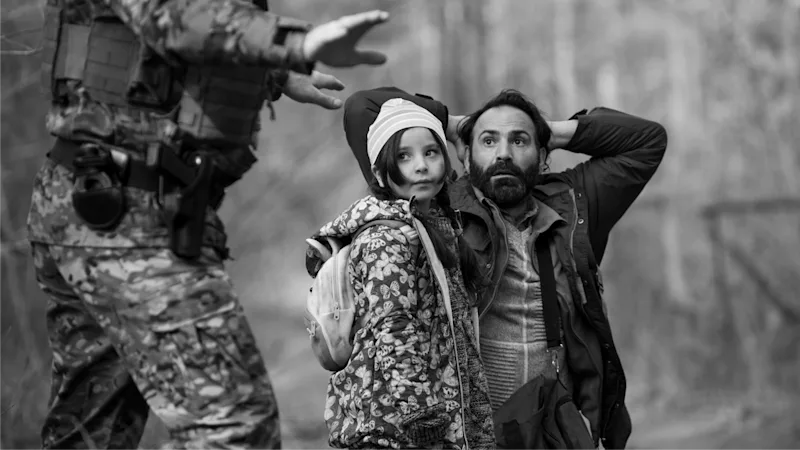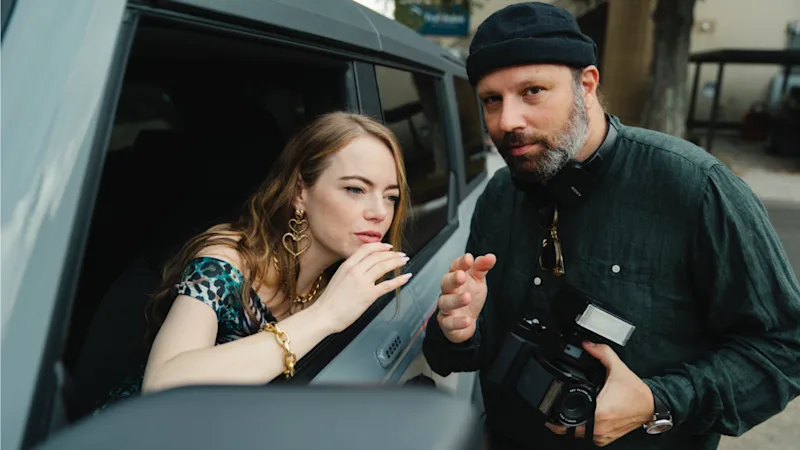When Kazu Hiro was 19 years old, he saw Leonard Bernstein for the first time in a documentary that aired on TV in Japan. An aspiring special effects makeup artist, Hiro found himself taken not by Bernstein's musical prowess, but by his face. "His face is really unique, and I think it's very handsome," he explains. "I really liked how he aged, too. The progression of his life showed on his face, which is something I always obsess about."
Decades later, Hiro would have the chance to recreate Bernstein's face using Bradley Cooper as his canvas. In Maestro, the Oscar-nominated actor portrays the great American composer over nearly 50 years of his life, and Cooper — who is also the film's director, co-writer and producer — knew that the level of transformation he hoped to achieve required a master. He needed a makeup artist who could change the shape of his chin, cheeks, ears, neck, and nose, in addition to aging and deaging him by 20 or so years.
For Hiro, "Maestro was something I was waiting for my entire career."
A two-time Oscar winner, Hiro designed the prosthetics that transformed Gary Oldman into Winston Churchill for 2017's Darkest Hour and Charlize Theron into Megyn Kelly and John Lithgow into Roger Ailes for 2019's Bombshell. Now one of the most in-demand makeup artists working today, Hiro has had to become more specific about the projects he takes on. "As I get older, my time gets more important, and I want to spend it wisely," he says.
Maestro — which centers on the complicated romance between Bernstein and his wife, the actress Felicia Montealegre (played in the film by Carey Mulligan) — was the sort of project that Hiro couldn't resist: A human drama, in which his prosthetics are not the star of the show. "I want my work to be invisible, rather than show off what I can do," Hiro tells A.frame. "That's my goal, because I love human beings, and I'm obsessed with the human face."

A.frame: How early on in the process were you brought on to Maestro, and what were those early conversations with Bradley about what he wanted to accomplish?
Bradley contacted me right before the pandemic, and because of the pandemic, we couldn't start until August of 2020. I met him in person, and we did the head cast and the scan and the photographs and everything. Of course, by that time, I read the script, and we were discussing, "How many different ages should we create?" Also, an important point was how close he wanted to look like Lenny. We had that discussion, and then we jumped into the makeup tests, and that was a process. We were trying to find the best way to tell the story by recreating Leonard Bernstein. Bradley had never had that many prosthetics on him before, so he also had to experience it and see how it felt to change his face and be in the character. That was a starting point, and then it was actually trying out the makeup and refining each test and doing a film test.
There's so much testing involved in the process, and the work ends up evolving so much. Is there a point where you know you've got it right?
Yes, I would say the point when I realize is when everything disappears and they become one human being. Because whenever I do makeup test, I try to look for what's wrong with it, and what could be better? I take pictures all the time and analyze everything, and then I'm trying different designs or refining and just cutting down on what's not necessary. Because if there's too much prosthetics on the face, that restricts the actor from expressing emotion. We don't want to put too much on his face. So, as we refined it, we started to feel like, "This is Lenny."
But the thing is, Bradley is such a perfectionist, and a kind of crazy perfectionist, and I am, too. We were improving even during production. We would look at each other in the mirror and talk about, what could be better? That was the process almost every day, and we really enjoyed the collaboration and discussing what we learned and how we could improve the look. Bradley also made an effort to lose weight, because Lenny had this particular kind of face with gaunt cheeks, but Bradley has really full cheeks. As he lost weight, he got closer to Lenny. We were joking at the end of the filming, like, "Maybe we should reshoot everything!" Bradley told me, "I know you would do it, because you're crazy," and I told him, "We are both crazy, so we should do it!"

You also made nose plugs to change the way Bradley sounded, to make him sound more like Lenny. How does that work?
Lenny had a deviated septum, so he had kind of a nasal voice. That is not something Bradley can control, so to help him, I originally made nose plugs to widen his nostrils — because Lenny's nose was wider — and at the same time, we adjusted the hole size on the nose plug, so it restricted airflow. It's just a slight difference. Like, when you get cold, your voice changes. It's the same thing, so that was what I did.
You said that you two are perfectionists, and that is a new level of perfectionism.
It's because of Bradley. Bradley is such an amazing actor and director, producer, and co-writer, and he has an infectious passion. He cares so much about the film, and the crew, and he loved everybody, and that really motivated us to do our best and raise the bar.
How is Bradley in the chair on the days when you have hours and hours of prosthetic work?
He was amazing. Most actors, when they sit in a chair, after 30 minutes, they knock off and they start to sleep. But Bradley knew if he slept, the process would take longer, because we have to support the actor's head. He was really conscious and very respectful, and he sat still. The only time he moved around was when he had to go to the restroom. That was an amazing process, and during that time, we discussed the scenes and stuff like that. I think his ability to connect with the people is amazing.

Do you have a favorite reaction to someone seeing him transformed into Lenny for the first time?
Of course, one was the Bernstein family. Those are the closest people to Lenny, and they were really touched by it. Alexander, his son, was almost crying just looking at him. That was a good sign that we were doing a good job. The other thing is, there are so many people who actually knew Lenny. When we shot in Ely Cathedral, some of the musicians had played with Lenny before, and they came up to me after filming, and they told me, "It really felt like I was playing for Lenny." That was great.
What do you do with all of the prosthetics at the end of a shoot?
They're just trashed. Because after removing those pieces, they're torn apart and we cannot use them. We have to make new ones for every day of filming.
When you watch the finished film, are you able to be swept away in it? Or like an actor watching their own performance, are you focused on your prosthetics?
The first time or second time, I'm really focused on my work and what I have done. Eventually, that fades away. And recently, I am able to see the movie as a movie, rather than analyzing my work. This case was different too, because usually what happens is right before the film is released, I see a rough cut to check everything. That's the scariest time to see my work in the film. But in this case, Bradley was really generous, and we saw so many different cuts of the movie even during filming. It changed a lot during editing, it was just amazing to see it that way. I consider this film to be a perfect film. It's not a simple biopic. It's a personal story of two people loving each other and their struggle with life, and that's my favorite kind of movie.
RELATED CONTENT:
Prosthetics Artist Kazu Hiro's Top 5
'It Was Like A Star Is Born on Steroids': Behind the Sound of 'Maestro' (Exclusive)







